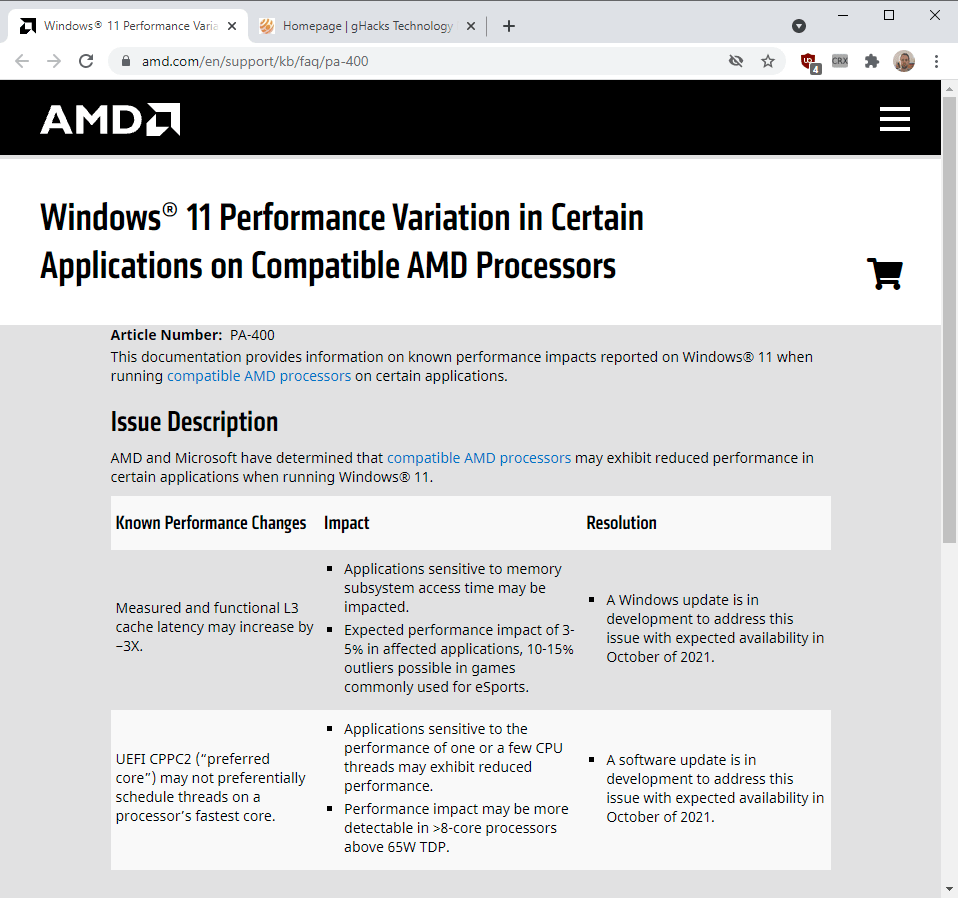AMD users who have upgraded their devices to Microsoft's new Windows 11 operating system or purchased a new AMD-powered device with Windows 11, may be impacted by an issue that may cause performance to drop by up to 15%.
AMD published a new support article on its website that provides details on the issue. According to AMD's document, performance may be impacted on Windows 11 devices for all compatible AMD processors, including the company's Ryzen 3, 3 Pro, 5, 5 Pro, 7, 7 Pro, Ryzen 9, Ryzen 9 Pro, Ryzen 9 Threadripper, and Epyc processors.
AMD users may check Microsoft's official list of supported processors to find out if their CPU is affected by the performance issue on Windows 11.
It is unclear if unsupported processors are also affected, as it is possible to install Windows 11 on systems deemed incompatible by Microsoft, but it is very likely that these are also affected.

AMD notes that the expected performance impact is 3% - 5% in affected applications, but that it may go up to 15% in games "commonly used for eSports". A second issue in UEFI CPPC2 may "not schedule threads on a processor's fastest core", which may also impact performance in certain applications.
| Known Performance Changes |
Impact | Resolution |
|---|---|---|
| Measured and functional L3 cache latency may increase by ~3X. | Applications sensitive to memory subsystem access time may be impacted. Expected performance impact of 3-5% in affected applications, 10-15% outliers possible in games commonly used for eSports. |
A Windows update is in development to address this issue with expected availability in October of 2021. |
| UEFI CPPC2 (“preferred core”) may not preferentially schedule threads on a processor’s fastest core. | Applications sensitive to the performance of one or a few CPU threads may exhibit reduced performance. Performance impact may be more detectable in >8-core processors above 65W TDP. |
A software update is in development to address this issue with expected availability in October of 2021. |
AMD notes that the issues are investigated by Microsoft and AMD, and that software updates are in development. The company expects these updates to be released in October 2021 as a Windows update and a software update. The Windows update will resolve the L3 cache issue, which appears to be the more serious issue, and that a software update will resolve the UEFI CPP2 issue.
A workaround is not available at the time. AMD suggests that customers use Windows 10 whenever possible instead as the operating system is not affected by the issue. (via Deskmodder)
Thank you for being a Ghacks reader. The post AMD says Windows 11 is slowing down its processors by up to 15% appeared first on gHacks Technology News.
https://ift.tt/3acHYVM
from gHacks Technology News https://ift.tt/3iH45Z0


No comments:
Post a Comment